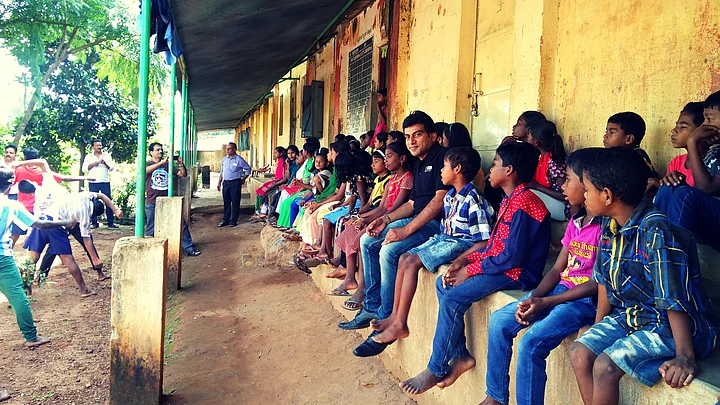As we head towards Sunabeda in southern Orissa, in India, lush forests on the undulating terrain begin to carpet the misty hills. We chase the breathtaking waterfalls to the precipice, tucked between the tall mountains where several streams drain into a catchment area.
The natives here, we are told, are proud to be known as 'Adivasis' (Aboriginals) rather than Tribals. Dubbed as the Silesia of India, this region is rich in minerals, natural resources and home to many industries.
Just after spotting a signboard reading "School for the deaf Sunabeda-3, Koraput" the car comes to a screeching halt. “Is this the school?” – was my first reaction when we stopped at what looked like a workers’ camp. Dr Patra, a volunteer, ushered us into a room, where I then sat anxiously awaiting the school’s headmaster. Binay Mishra has been the head of the school since its inception. He is an eloquent speaker, and his pleasing personality and gentle manner motivate and help the children. He took us immediately to see the children.
The children have a remarkable method of greeting someone. Approaching us with a pad in hand, they quickly scribbled the message: "Welcome to our school Sir and Madam."
We noticed how the children communicated spontaneously and rapidly with each other, exchanging indulgent smiles, maintaining eye contact and using dactylology and lipreading. The school was established in 1986, and the majority of its alumni are currently successfully employed by the government or have found vocational careers and achieved economic autarky – Binay Mishra tells us, with a twinkle in his eye.
Volunteering and spending quality time during the weekends at the schools of rural India has always brought great contentment and joy to my inner self. To share, exchange thoughts with children from every walk of life is a meaningful experience. My first ever volunteering experience was in the schools in the Kumaon foothills of the mighty Himalayas, and I have been actively visiting schools ever since I was with the National Geographic. However, this time, my experience has been very different.
Profoundly deaf people in some parts of the globe are still referred to as ‘Deaf and Dumb’, which is now a widely recognised catachresis. The word ‘dumb’ should no longer be employed to define people who are hard of hearing. It is not only inappropriate but also highly offensive and hurtful. These physical conditions are either congenital or occur during infancy, and should thus be considered a ‘protected characteristic’ under the International law, or Persons with Disabilities (Equal Opportunities, Protection of Rights and Full Participation) Act, 1995 under the Indian law. Hard of hearing people deserve happiness have a right to dream, and they are entitled to respect.
At a quarter past nine that Sunday morning, the teacher Anand Mouli Patnaik arrived, and the children cheered and eagerly followed after him to their martial arts class. A technician at Hindustan Aeronautics Ltd, Sunabeda, Anand has a gift for teaching martial arts to the deprived.
Dr Umasankar Patra, a lecturer at the nearby Semliguda College, is a real mensch, one of the longest-serving volunteers at this school. He believes that volunteering has not only changed but also enriched his life. Another volunteer, Annapurna, had brought a smorgasbord of sweetmeats to distribute among the children. She is an HR director for a software company and told Anand that the girls at the school also get karate training. I nodded and raised my thumb.
We felt terribly privileged receiving, as we did, undivided attention from the children, who entertained us by frolicking about, by showing us their drawings, and by demonstrating their martial arts skills. But it saddened and alarmed us to hear that in the past two decades, there has been a significant increase in stillbirth and children with profound deafness.
After a prolonged discussion and cause and effect analysis, I learned that one of the reasons of the problem is that the women drink illicit liquor, using excessive tobacco and substance during their pregnancy. All of these substances endanger the life and physical and psychological development of foetuses, and also aggravate stress-induced diseases that occur during pregnancy.
To our dismay, we found four siblings from the same parents who had been born deaf, and we were able to speak to some local elected representatives, social activists and NGOs who urged us to align with this cause and do what is possible to fortify their condition.
It is imperative that these children receive the help they so deserve. Truly, the voice of their eyes is deeper than the secret language of roses and we were so inspired by their enthusiasm and spirit, the glow in their faces while posing for selfies. What could we give them in return? They were deeply impressed and overawed by the technology we’d brought with us. Fired up by seeing themselves in photos and videos, the technology helped them transcend their disability.
We do not want more hard-of-hearing schools, I thought, as we left the school.
“I will come back and contribute to establishing an awareness drive to counsel women, primigravidae and men,” my conscience echoed back to me.
And my heart chimed in joy: “I salute the divinity within these children.”
(Sunil Dhavala is a media entrepreneur. He has held senior management roles at National Geographic Channel, Fox Broadcasting, Radio Television Luxembourg and other media companies. He is assisting companies in managing their CSR initiatives. He has also been volunteering for schools in remote areas of the country.)
(At The Quint, we question everything. Play an active role in shaping our journalism by becoming a member today.)
